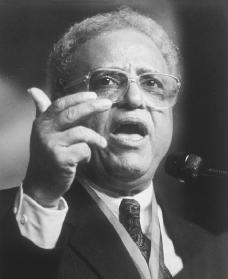Bro. Benjamin L. Hooks
Attorney Benjamin Lawson Hooks (born 1925) was the executive director of the National Association for the Advancement of Colored People and served from 1972 to 1977 as the first African American commissioner of the Federal Communications Commission. He led the historic prayer vigil in Washington DC in 1979 against the Mott anti-busing amendment which was eventually defeated in Congress.
Benjamin Lawson Hooks, the fifth of seven children, was born in Memphis, Tennessee, in 1925 to Robert B. and Bessie Hooks. Hooks' family was relatively prosperous because, in 1907, his father and uncle established a successful photography business that was widely patronized by the Memphis African-American community. Because the society was so rigidly segregated along racial lines at that time, many establishments would not serve African Americans. Consequently, numerous African American-owned businesses were founded in the South to meet the needs of the African American populace. His grandmother, a musician who graduated from Berea College in Kentucky, was the second African American female college graduate in the nation. With such evidence of success and hard work as his personal examples, Hooks was encouraged to do well in his studies and prepare for higher education.
Following the Depression of 1929, changes occurred in the Hooks family's standard of living. With money so scarce during those years, African American clients could rarely afford the luxury of wedding pictures or family portraits, so business came to a virtual standstill. They were sad days indeed when the lights were turned out in the Hooks' home and when the bank foreclosed on the mortgage. Still, the family always had clothing and shelter, and no one ever went hungry. In the years after the Depression the family business revived and even several decades later, after his father's death, one of Hooks' brothers continued to maintain it. Perhaps because of the rigors of business life and social prominence in the African American community, Hooks' parents were careful to see that all of their children were conscientious about their appearance, attitude, and academic performance. Hooks learned discipline from his parents' teaching and example.
After completing high school, Hooks decided to remain in Memphis to study pre-law at LeMoyne College. He successfully completed that program and then headed for Italy, where he served in the army during World War II guarding Italian prisoners of war. He felt humiliated that these prisoners were allowed to eat in restaurants that were off limits to him, and that in Memphis, they would have more rights than he. The experience deepened his resolve to do something about the bigotry in the South. When he returned to the United States, he continued his studies at Howard University. From there he went to Chicago where he attended DePaul University Law School - since no law school in the South would admit him. Although he could have established a law practice in Chicago when he graduated in 1948, he chose to return to Memphis to aid in the struggle for civil rights in the South. From 1949 to 1965 he practiced law in Memphis, as one of the few African American lawyers in town.. He recalled in Jet magazine "At that time you were insulted by law clerks, excluded from white bar associations and when I was in court, I was lucky to be called 'Ben.' Usually it was just 'boy' [But] the judges were always fair. The discrimination of those days has changed and today, the South is ahead of the North in many respects of civil rights progress."
In 1949, Hooks met a 24 year old teacher named Frances Dancy, whom he met at the Shelby County Fair. In 1952 they were married. Frances Hooks recalled in Ebony magazine that her husband was "good-looking, very quiet very intelligent. … He loved to go around to churches and that type of thing, so I started going with him. He was really a good catch."
For years Hooks resisted the call to the gospel ministry. His father had little respect for organized religion, and Hooks had no urge to go against his father's wishes. However, in 1955 he began to preach, and in 1956 he was ordained a Baptist minister. He joined Reverend Martin Luther King's Southern Christian Leadership Conference. He pastored a church in Memphis and one in Detroit at the same time. Hooks, a man of many talents, was not content with his two chosen professions. His interest in business prompted him to become a bank director, the co-founder of a life insurance company, and the founder of an unsuccessful fried-chicken franchise. After several attempts to be elected to public office as a Republican candidate, his political ambitions were realized when he was appointed to serve as a criminal judge in Shelby County (Memphis) in 1965. He thus became the first African American criminal court judge in Tennessee history. The following year he was elected to the same position.
No matter how busy he was with his varied activities, Hooks always found time to take part in civil rights protests. He became a life member of the National Association for the Advancement of Colored People (NAACP) and served on the board of the Southern Christian Leadership Conference (SCLC). He was a pioneer in the NAACP-sponsored restaurant sit-ins and other boycotts that demonstrated the economic power as well as the anger of the African American community against the discrimination that was so pervasive at the time. In spite of his shyness he became a proficient orator whose combination of quick wit and homespun humor delighted audiences. He used this ability as the moderator of television shows called Conversations in Black and White and Forty Percent Speak (the percent of the African American population of Memphis) and as a panelist on the program What Is Your Faith?
Feature Page - Bro. Benjamin Hooks pg. 2